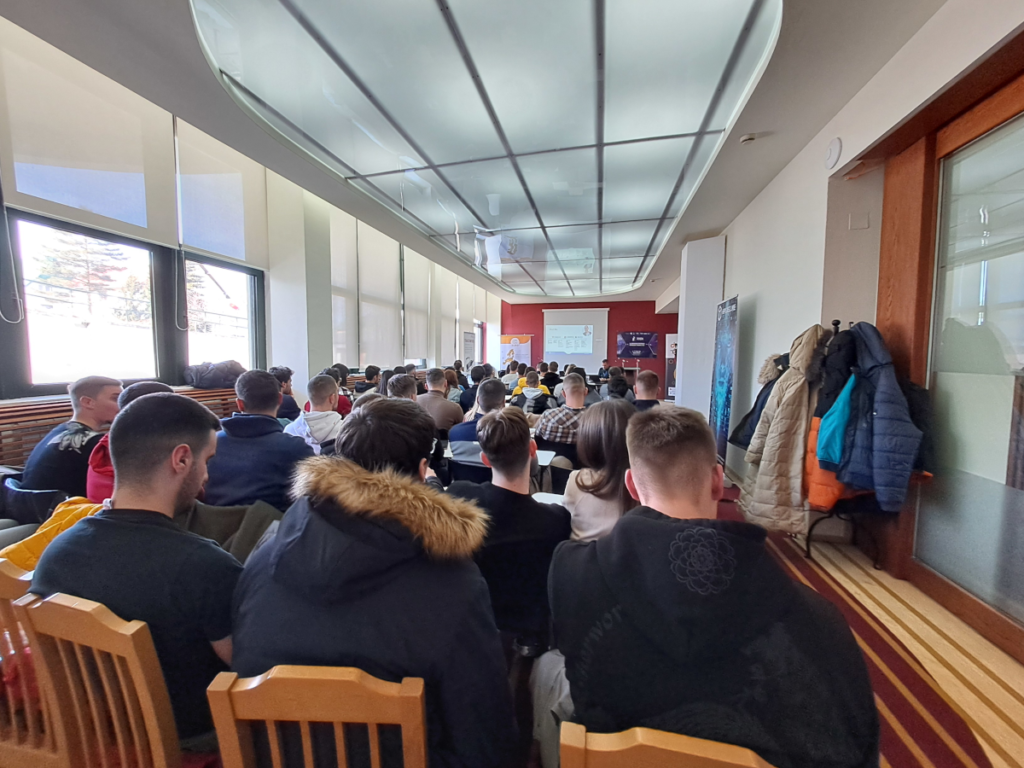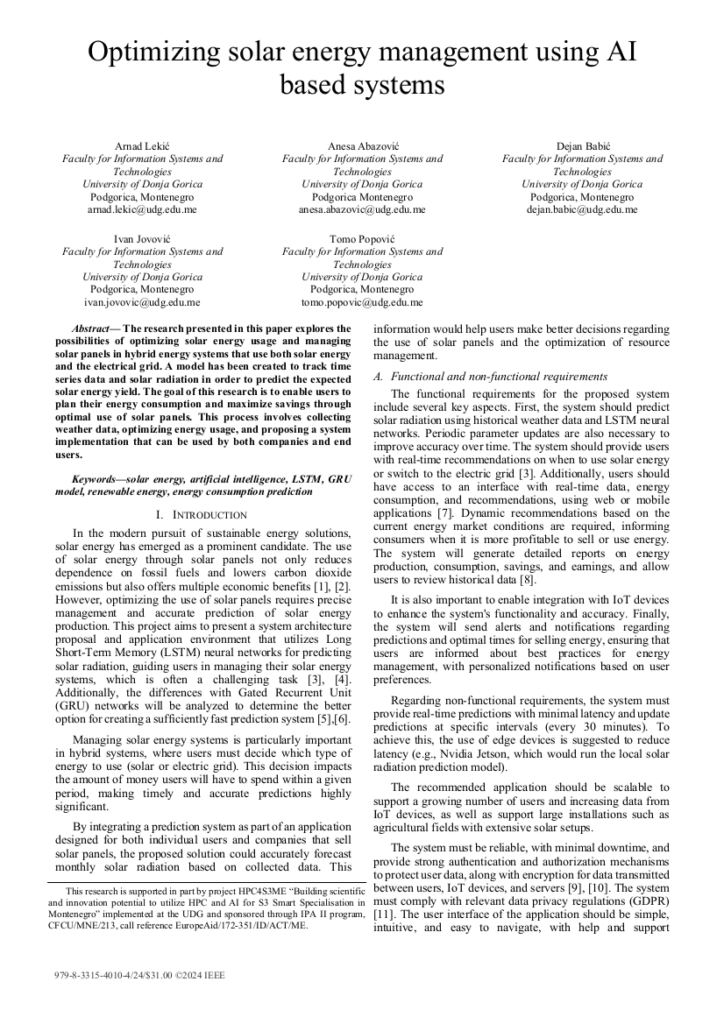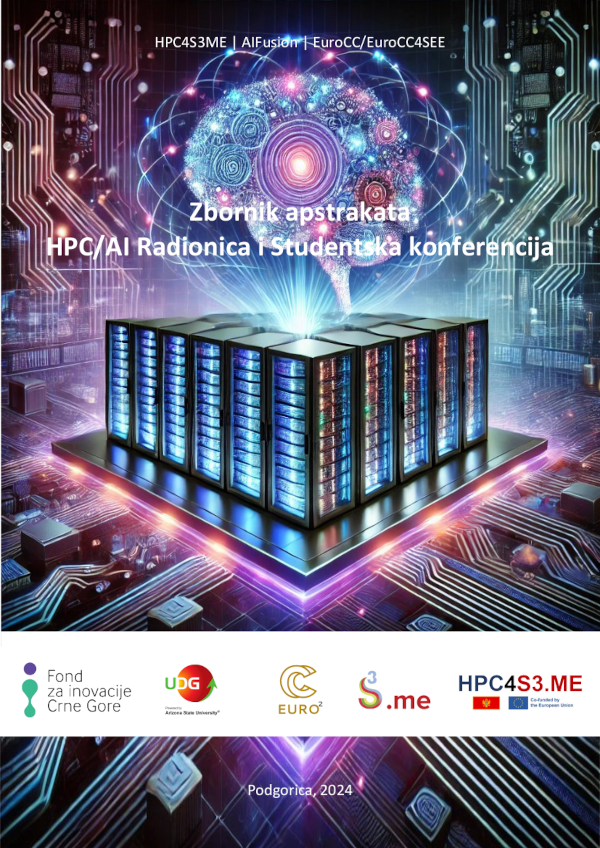Scientific Papers
Stevan Cakic, Tomo Popovic, Srdjan Krco, Ivan Jovovic, Dejan Babic, “Evaluating the FLUX.1 Synthetic Data on YOLOv9 for AI-Powered Poultry Farming“, submitted to the Journal of Applied Sciences, Mar 2025
ABSTRACT – This research explores the role of synthetic data in enhancing the accuracy of deep learning models for automated poultry farm management. A hybrid dataset was created by combining real images of chickens with 400 FLUX.1 [dev] generated synthetic images, aiming to reduce reliance on extensive manual data collection. The YOLOv9 model was trained on various dataset compositions to assess the impact of synthetic data on detection performance. Additionally, automated annotation techniques utilizing Grounding DINO and SAM2 streamlined dataset labeling, significantly reducing manual effort. Experimental results demonstrate that models trained on a balanced combination of real and synthetic images performed comparably to those trained on larger, augmented datasets, confirming the effectiveness of synthetic data in improving model generalization. The best-performing model trained on 300 real and 100 synthetic images achieved mAP = 0.829, while models trained on 100 real and 300 synthetic images reached mAP = 0.820, highlighting the potential of generative AI to bridge data scarcity gaps in precision poultry farming. This study demonstrates that synthetic data can enhance AI-driven poultry monitoring and reduce the importance of collecting real data.

Arnad Lekic, Anesa Abazovic, Dejan Babic, Ivan Jovovic, Tomo Popovic, “Optimizing solar energy management using AI based systems“, 8th International Symposium on Innovative Approaches in Smart Technologies, Istanbul, Turkiye, Dec 2024 (Accepted)
ABSTRACT – The research presented in this paper explores the possibilities of optimizing solar energy usage and managing solar panels in hybrid energy systems that use both solar energy and the electrical grid. A model has been created to track time series data and solar radiation in order to predict the expected solar energy yield. The goal of this research is to enable users to plan their energy consumption and maximize savings through optimal use of solar panels. This process involves collecting weather data, optimizing energy usage, and proposing a system implementation that can be used by both companies and end users.

Elvis Taruh, Marko Raicevic, Ivan Jovovic, Dejan Babic, Tomo Popovic, “Detection of Livestock Using Edge Devices“, 5th International Conference on Communications, Information, Electronic and Energy Systems (CIEES), Nov 2024 (Accepted, Presented)
ABSTRACT – This paper presents the development of a real-time system for detecting and monitoring large livestock using cameras connected to a Jetson Nano device and the YOLO v8 model for animal recognition (specifically cattle). The implementation of this system enables precise tracking of livestock movements and conditions, facilitating supervision and management on farms. The system provides real-time notifications and information crucial for efficient resource management. Model evaluation showed an accuracy of 65% after 35 epochs of training. The developed platform demonstrates potential for improving efficiency and safety in agricultural enterprises with possibilities for further enhancement and scaling.
Sara Kovacevic, Tomo Popovic, Ivan Jovovic, and Stevan Cakic, “Hotel Chatbot Receptionist for Smart Hospitality”, 28th International Conference on Information Technology (IT), IEEE IT 2024, Zabljak Montenegro, Feb 2024
ABSTRACT – The dynamic changes in the global business landscape are being driven by cutting-edge technologies such as artificial intelligence and machine learning, blockchain, and high-performance computing. Recognizing the pivotal role of digital transformation, particularly in the tourism sector, Montenegro has started embracing innovative solutions. The continuous evolution of technology has significantly influenced the tourism industry presenting an opportunity for digital transformation in the sector. The introduction of chatbots in Montenegrin hotels and resorts emerges as a potential game-changer. This implementation aims not only to reduce waiting times at reception but also to elevate the overall user experience. By adopting hotel chatbots in different hotels, each establishment can have a dedicated knowledge base tailored to its specific policies and regulations. This approach ensures a seamless integration of technology that not only enhances operational efficiency, but also enriches the offerings within the tourism and hospitality sector in Montenegro.
Dejan Babic, Luka Filipovic, Sandra Tinaj, Ivana Katnic, Stevan Cakic, “Ten Year Cardiovascular Risk Estimation: A Machine Learning Approach”, Proceedings of MEDICON 2023 Conference, Sarajevo, Sep 2023, pp 605-612
ABSTRACT – Cardiovascular disease is one of the most common causes of death in the world. Usual practice in medicine is estimation of 10 years risk of patients developing cardiovascular disease. This practice enables taking preventive measures such as early medical treatments and lifestyle changes. The key step is to accurately assess the risk where the patients can be treated accordingly. With advancement of Artificial Intelligence and ML in medicine, this study aims to present a comprehensive analysis of the use of these techniques in the sense of predicting the risk, and therefore evaluate their potential in identifying patients with possibilities of developing cardiovascular disease. First, an analysis of the working dataset is provided. Then, various traditional classification models are implemented and trained on the dataset, and their performance is compared. The classifying models used in this research include SVC, KNN etc. The results of this study are presented in systematic comparison, where the performances of all the models are represented with discussion about challenges and possible limitations of the data regarding this particular problem. Normalization and oversampling techniques were used and reduced the overfitting problem.
Ivan Jovovic, Marko Grebovic, Lejla Gurbeta-Pokvic, Tomo Popovic, Stevan Cakic, “Liver Diseases Classification Using Machine Learning Algorithms”, Proceedings of MEDICON 2023 Conference, Sarajevo, Sep 2023, pp 585-593
ABSTRACT – This study aims to show how Artificial Intelligence can help predict liver diseases based on the patient’s parameters. The focus is to provide a reliable and accurate tool to support healthcare professionals in this process. Alongside dataset preparation and feature engineering, three well-known machine learning algorithms were used to achieve this goal: Support Vector Machine, Random Forest, and XGBoost, alongside with simple Artificial Neural Network model. The best-performing model was SVM, with an average precision of 88%, which has similar results as the precisions achieved in the papers mentioned below, but with a slightly different approach, especially in dataset preparation.
Tamara Pavlovic, Marko Grebovic, Armin Alibasic, Milica Vukotic, Stevan Sandi, “Forecasting Icterus with Machine Learning: An Advanced Classification Model analysis”, Proceedings of MEDICON 2023 Conference, Sarajevo, Sep 2023, pp 673-683
ABSTRACT – Icterus is a medical condition characterized by the yellowing of the skin and sclera caused by the accumulation of bilirubin in the body. There are three main types of icterus: extrahepatic, intrahepatic, and prehepatic, and accurately diagnosing the type is crucial for treatment. Machine learning classification techniques can aid in the accurate and timely diagnosis of icterus types. The present study utilized multiple Machine Learning classification models to predict icterus type on a custom dataset and demonstrated the models’ performances in estimating icterus type. The MLP Classifier with five hidden layers achieved the best results. However, the models still struggled to differentiate between instances of extrahepatic and prehepatic types, indicating the need for improvements to enhance the models’ performance.
Zoja Scekic, Luka Filipovic, Ivana Katnic, Nela Milosevic, Stevan Sandi, “Thyroid Hormones Parameter-Based Classification of Patient Health Status: An analysis of Machine Learning techniques”, Proceedings of MEDICON 2023 Conference, Sarajevo, Sep 2023, pp 673-683
ABSTRACT – Thyroid autoimmune diseases are widely spread and present in the world population. The problem with these diseases is that giving the diagnosis is often challenging, as the symptoms are similar with some other health problems (for example, depression). This paper proposes utilization of machine learning (ML) algorithms for disease diagnosis based on patients’ thyroid hormones levels. The experiment was done on a dataset that consisting of 2000 data samples with following parameters: TSH, FT4, TT3, SHBG, and T total hormones. Dataset was prepared before feeding into machine learning models. ML algorithms used in the experiment were Logistic Regression, Random Forest Classifier, Naive Bayes, and Support Vector Machines (SVM). For evaluation, multiple metrics were used: confusion matrix, precision, recall, and accuracy. The whole process could be more efficient and accurate with use of good quality artificial intelligence systems as help in making a better diagnosis.
Anesa Abazovic, Arnad Lekic, Ivan Jovovic, Stevan Cakic, Tomo Popovic, Ovarian Cancer Detection Using Computer Vision, Proceedings of the 2024 23rd International Symposium INFOTEH-JAHORINA (INFOTEH), Mar 2024
ABSTRACT – This study explores the application of artificial intelligence (AI) and deep learning in the field of computer vision, specifically for the detection of ovarian cancer. A computer vision model was developed, utilizing two different AI models, YOLOv8 and YOLOv7, to evaluate their effectiveness in this medical context. YOLOv8, being the current state-of-the-art model in computer vision, was chosen for its advanced capabilities, while YOLOv7 was selected for its established usage and performance record. Comparative analysis revealed that YOLOv8 outperformed YOLOv7 with a significantly higher accuracy rate of approximately 0.9. This enhanced accuracy is crucial in medical applications, particularly for early cancer detection which can substantially improve patient outcomes. Additionally, the model was benchmarked against other machine learning models and existing computer vision approaches in ovarian cancer detection. While this model demonstrated superior accuracy compared to other machine learning techniques, it was observed that certain other computer vision models, leveraging more customized architectures and larger datasets, achieved marginally better results. These findings indicate potential areas for future improvement of implemented model, including the integration of more comprehensive datasets and the refinement of model architecture. Furthermore, the research proposes the incorporation of additional health parameters to enhance the model’s effectiveness and applicability in medical diagnostics.

Master Theses
Ms Tamara Pavlovic (Oct 2024) – AI in medicine: breast cancer detection using computer vision methods
ABSTRACT – Artificial Intelligence (AI) is revolutionizing numerous sectors, including medicine, by offering innovative methods for diagnosing, treating, and researching diseases. This master’s thesis focuses on the application of AI in the diagnosis of breast cancer, using computer vision algorithms to analyze mammographic images. Through a combination of convolutional neural networks (CNNs) and deep learning, models have been developed that identify malignant changes, potentially contributing to earlier and more precise disease detection. The thesis examines in detail how AI can improve the efficiency of screening processes, reduce the time required for diagnosis, and enable a more personalized approach to treatment. In addition to technological progress, ethical issues such as patient safety and the transparency of AI systems are also considered. The results of this study confirm that the application of AI in breast cancer diagnostics can significantly enhance medical procedures. The models tested, ResNet152 and DenseNet121, demonstrated quite good performance in classifying breast cancer. Their AUC scores, which exceed the threshold of 0.9, indicate their potential for use in clinical practice. These findings not only contribute to the improvement of diagnostic processes but also open up opportunities for further research and development of AI technologies in medicine.
Ms Zoja Scekic (Oct2024) – Deep learning and applications in energy sector.
ABSTRACT – This master’s thesis explores the application of advanced deep learning models for predicting day-ahead electricity prices, focusing on the accuracy and efficiency of these models compared to traditional forecasting methods. With the increasing integration of renewable energy sources and the growing complexity of electricity markets, accurate price forecasting has become crucial for market participants, grid operators, and policymakers. The research is structured around four case studies, each employing different deep learning techniques, such as Artificial Neural Networks (ANN), Long Short-Term Memory (LSTM), Convolutional Neural Networks (CNN), and hybrid models like CNN-LSTM. Despite the promising results, the research recognizes limitations related to data quality, model complexity, and computational resource requirements. The study emphasizes the need for further research into optimizing model efficiency, integrating more diverse data sources, and expanding the applicability of these models to different energy markets.
Mr Dejan Babic (Jun 2023) – Computer vision and AI in medicine
ABSTRACT – Artificial Intelligence is transforming the way we live, work, and communicate with the world. The proliferation of data has been the biggest driver of AI in recent years. AI in medicine is rapidly developing and holds great potential in revolutionizing healthcare systems. Its application is already producing promising results in disease detection, diagnosis and drug discovery. AI is widely used in medical facilities worldwide as a decision support tool for patient diagnosis. It is expected to bring significant benefits to healthcare sector. In this thesis, the focus is on the application of artificial intelligence and computer vision in solving real medical problems. The research is both theoretical and empirical and focuses on the application of artificial intelligence and computer vision in the detection of pneumonia, segmentation of blood vessels in the retina, and estimation of cardiovascular risk. The main goal of the research is to achieve the highest possible accuracy in specific cases and approaches, in order for these approaches to be considered applicable in medicine. Throughout the study, some of the ethical issues related to the use of this technology were also raised. At the end of the study, the results, potential challenges, and future directions of this research were discussed.
Mr Ivan Jovovic (Jun 2023) – The use of Artificial Intelligence on Edge (Edge AI)
ABSTRACT – This thesis explores the combination of artificial intelligence, machine learning, deep learning, and edge computing in modern applications, with a special focus on medicine and agriculture. The paper first introduces the reader to the basic terms and definitions of machine learning, deep learning, computer vision, the Internet of Things and Edge computing. After the theoretical basis, the work provides an insight into the practical applications of these technologies in medicine and agriculture, highlighting the benefits and drawbacks of their applications. In the following, the paper offers a detailed study of practical examples of edge artificial intelligence in agriculture and healthcare, as well as artificial intelligence in the field of medicine, with focus on disease classification. Through the realization and implementation of these projects, the interpretation of the results and the discussion, the paper emphasizes the importance of the integration of artificial intelligence and edge computing in various industries.
BSc Theses
Ms Sara Kovacevic (Sep 2024) – Hotel ChatBot receptionist for smart hospitality.
ABSTRACT – The aim of this thesis is to examine the advancements and applications of chatbots in hotels to enhance customer experience and operational efficiency in Montenegro, which aspires to become a prestigious tourist destination. Emphasis is placed on the use of artificial intelligence (AI), machine learning (ML), and high-performance computing (HPC) to develop advanced digital solutions. The automation of guest communication through chatbots reduces the burden on staff and increases customer satisfaction, especially during the tourist season when there are significant fluctuations in the number of visitors. The research analyzes key aspects of implementing chatbot technology, including the challenges and benefits of using the Voiceflow platform for development and testing. It studies data on guest preferences and service personalization, contributing to a better understanding of user needs and tailoring hotel offerings to meet their expectations. The thesis advises further optimization of chatbot functionalities, staff training, and regular collection of guest feedback. These recommendations enable Montenegrin hotels to improve their offerings and stand out in the global market competition. This work represents an important contribution to the advancement of digital solutions in Montenegro and can serve as a starting point for future research.
Ms Jovana Mitric (Oct 2024) – AI and machine learning for applications in cultural heritage preservation.
ABSTRACT – This thesis presents research on artificial intelligence (AI) and machine learning (ML), and their potential application in the preservation of cultural heritage, with a special focus on Montenegro. Computer vision, as a specific field of artificial intelligence, was explored. The paper addresses the implementation of modern technologies, specifically computer vision, in the field of cultural tourism to enhance the visibility and preservation of cultural monuments. By using available tools such as the Roboflow platform for image annotation and Google Colaboratory for model training, a web application was developed using the Flask framework, which recognizes cultural
monuments based on images, powered by the YOLO v8 model. Additionally, the thesis discusses the broader context of AI applications in the preservation of cultural heritage and its promotion for tourism purposes, with particular emphasis on the potential for technological enhancement of Montenegro’s tourism offerings. The importance of digital transformation in tourism for Montenegro and its positioning in the global tourism market is highlighted.
Mr Marko Lasica (Oct 2023) – AI models for real estate pricing based on web scraped data
ABSTRACT – The development of generative models and exponential progress in artificial intelligence have opened up new application possibilities in many areas of economic life. One of the possibilities is developing an AI model for predicting market prices based on data extracted from the web. This paper introduces the reader to the technique of automated downloading and grouping of data from the web, known as web scraping, and the development of a predictive model that, based on the collected data, would predict real estate prices. The paper presents the practical part of the work, the implementation of a predictive model developed using the decision tree technique. In conclusion, the work contributes to the understanding of how the combination of these techniques improves decision-making processes in the real estate market.
Ms Elda Kalac (Jul 2023) – Artificial intelligence and big data analytics
ABSTRACT – This thesis explores the topic of artificial intelligence and big data analytics. The purpose of the study is to provide a theoretical framework for understanding the concepts of artificial intelligence and big data analytics, and to investigate their mutual interaction. The research methodology includes the selection of appropriate methods and algorithms for analyzing big data, description of the data used in the study, and planning of experiments and performance evaluation. Additionally, examples of artificial intelligence algorithms applied in big data analytics are presented. Through the analysis and interpretation of results, the implications of these techniques for enhancing data understanding and making informed decisions are discussed. The conclusion summarizes the main findings of the research and proposes avenues for further exploration. This work provides a foundation for further research in the field of artificial intelligence and big data analytics.
Mr Elvis Taruh (Jul 2023) – AI and video games
ABSTRACT – The paper investigates the application of artificial intelligence (AI) in video games and its impact on the player’s experience. Basic concepts of AI are studied, as well as various methods of applying AI in games, including character management, combat algorithms, pathfinding algorithms, and mission and scenario generation. Ethical aspects of the application of AI in video games are also analyzed, including the impact on social interactions, detection and prevention of cheating, and the development and use of AI in the game industry. Through this paper, the importance of AI in improving the gaming experience is emphasized, but also questions about ethics and challenges faced by players while playing games are also raised. All the aforementioned analyzes provide the paper with an insight into the current state and future possibilities of the application of AI in video games.
Mr Nikola Kavaric (Jul 2023) – Explainable Artificial Intelligence
ABSTRACT – This main premise of the researrch is to show an introduction to Artificial Intelligence and machine learning, and then to address the challenges of interpretability of results coming from the application of artificial intelligence algorithms. Can we trust it? On exactly what data are the prediction models that are the result of machine learning based? The candidate analyzed and processed the challenges of explainable and interpretable artificial intelligence through a literature review. This is a very current and challenging topic and field.
Ms Tamara Lasica (Jul 2023) – Generative Artificial Intelligence (GenAI)
ABSTRACT – When OpenAI developed a new model of generative artificial intelligence and made it available to the public at the end of 2022, in the form of the chatbot ChatGPT, and the number of its users grew to 200 million within two months, a real explosion took place in the world of artificial intelligence and it became clear to everyone that nothing would be the same in the future. This work tries to present and approach the reader in a systematized way this powerful technology that gives robots the ability to “talk” to us, and to create original content from text, to images, music and 3D animations, imitating human creativity at our request. As generative artificial intelligence (GenAI) is rapidly developing and has the potential to change many industries, this paper considers numerous possibilities of its application, as well as the possibility of abuse and the necessity of introducing legal regulation of artificial intelligence.
Other
HPC-AI Workshop and Stdutents Conference (Dec 2024)
The Book of Abstracts from HPC/AI Workshop and students’ conference that took place at the end of 2024.

